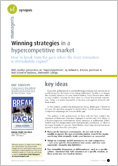Break from the Pack

The author gives companies fresh perspectives on differentiating themselves in an economy characterized by the accelerated commoditization of products and service.
Author(s): Oren Harari
Publisher: FT Press
Date of publication: 2006
Manageris opinion
A consultant and recognized author, Oren Harari has written an original book that provides provocative and extremely rich examples, to give companies fresh perspectives on differentiating themselves in an economy characterized by the accelerated commoditization of products and service.
Comparing the global economy to a pack of runners in a race, from which it is difficult to break away on a lasting basis, the author describes the traps into which companies often fall, e.g. attempt to improve their existing products and services rather than identify what the market will want tomorrow, try to cut costs to restore profits, lower prices to win market share, seek growth at all costs, focus their efforts on satisfying today’s customers, etc. Many executives will recognize their company in this first section.
So what to do, when innovations are immediately copied, when nothing is left to stop your competitors from attacking your market? Above all, accept this state of affairs rather than get lost in the illusory quest for lasting competitive advantage, which often blinds companies to the fact that what they believe to be an advantage is no longer advantageous.
The author analyzes real-life cases of companies that have succeeded in durably breaking away from the pack, and draw interesting lessons for any business that faces fierce competition.
The key idea, developed in chapter 3, is that a company must not become set in its ways, but instead must reinvent itself continuously. Throughout this chapter, the author uses the metaphor of Madonna – a pop icon symbolizing this strategy of continuous reinvention. He uses this image to proffer a great deal of advice on the principle factors required to make this type of strategy successful.
In the second part of the book, he offers a detailed description of the keys to success in an economy of commoditized offerings, specifically the need for companies to concentrate their efforts and specialize instead of spreading themselves too thinly in the uncontrolled search for growth. He also points out that differentiation opportunities continue to exist, albeit in other registers than the offering per se, through the mission of the company (chapter 6), or through the emotional link created with customers (chapter 8). Boldness, combined with real discipline in carrying out sometimes destabilizing ideas, is also a key success factor.
Finally, in part three, the author returns more concretely to management practices to be established in the organization, such as the continuous effort to attract good talent inside and outside the company.
